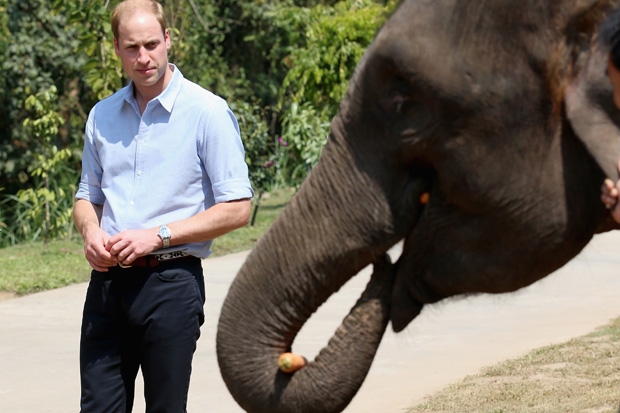How good a deal for Britain is it that the president of China got a state visit and a nuclear power station and Prince William got the chance to go on Chinese television and complain about the ivory trade? The Prince was listened to politely, of course, but the Chinese will not give up their enthusiasm for the stuff. The elephant in the room, to misapply that expression, is that only a legal trade in ivory will save the species. Just as cows exist in any numbers only because we eat their flesh and drink their milk, so elephants have a future only if it is profitable to breed them. Throughout the commodity boom that has now ended, Africa has done very well out of China’s demand for raw materials. If it were permitted to breed elephants, let rich people kill them, and then sell their tusks, it would be a richer continent, and the bush would echo to the trumpeting of plentiful herds.
Sentimental, I know, but I found it infinitely touching to see snatched photographs of Jeremy Corbyn in his white tie at Buckingham Palace. He reminded me of his fellow north London resident Mr Charles Pooter attending the Lord Mayor’s Ball.
Supporters of the hereditary principle will be pleased to see that Justin Trudeau has just led the Liberal party to victory in Canada, but the trouble with such grandees is that they cannot get old imperial ideas out of their heads. Mr Trudeau is a firm supporter of the ruling by the Canadian Supreme Court that Muslim women immigrants should be allowed to wear the niqab throughout their citizenship ceremonies, thus hiding their faces from those conferring these rights upon them. In the old colonial days, the white man’s attitude was that it didn’t matter how the various tribes and sects behaved towards their women so long as they accepted his authority. But today we are talking about equal citizenship, not subjection.
Last week, I attended a commemoration in the crypt of the House of Commons of the 25th anniversary of the murder of Ian Gow. Gow, who had been Mrs Thatcher’s brilliant parliamentary private secretary at the beginning of the 1980s, was killed outside his Sussex house by a bomb planted under his car by the IRA. It was probably his connection with her, and his strong Ulster unionism, which made him a target. It is striking how Mrs Thatcher’s time in Downing Street is bookended by Irish Republican atrocities. Just before she won in 1979, her leadership campaign manager, Airey Neave, was blown up by the Irish National Liberation Army. Not long after Ian was killed, she fell from office. As I write this, I read that ‘the army council of the Provisional IRA still directs the operations of Sinn Fein’. Sinn Fein is the second party of government in Northern Ireland. I think of those lines of MacNeice: ‘Slowly the poison the whole bloodstream fills. /The waste remains; the waste remains and kills’.
And this Friday, in St Bartholomew’s Hospital, we shall gather to remember another IRA victim, Gordon Hamilton-Fairley. Gordon died 40 years ago because his dog sniffed under the car of his London neighbour Hugh Fraser MP, detonating the bomb the IRA had intended for him. Gordon was a gentle, brilliant man (and my parents’ neighbour and friend in their early married life). He was a leading expert on childhood leukaemia, a life-saver cut off in his prime. I don’t like the use of the word ‘innocent victim’ – because if Hugh Fraser, not Gordon had died, he would have been equally innocent — but there is something especially poignant about his random death. Thanks to Gordon’s strong widow, Daphne, and the family, his spirit still does good in the world. The money collected at the commemoration will go to the Fairley House School for Children with Specific Learning Difficulties.
After my experiences promoting volume one of my biography of Mrs Thatcher, I had focused on boarding schools for sales of volume two (just published). This was because I discovered that pupils liked to buy the book to give to their parents for Christmas, secure in the knowledge that they could put it on their parents’ extras bill. As a result, sales were brisk. So imagine my dismay, shortly before addressing the Eton Political Society recently, when I received an email informing me that the ‘Lower Man’ (not a term of abuse, but the Eton slang for what other schools would call the deputy head) had just banned this practice. About 120 boys turned up to hear me. It is a credit to them that they bought eight copies; but under the old dispensation, they would have bought 80.
On 13 October (the day when Mrs Thatcher would have been 90), the Spectator’s cartoonist, Michael Heath, was 80. Michael drew his first picture for this paper (an illustration for the letters page) in 1959, when I was two years old, and he draws for it still. I wish, though, that readers could hear him talk as well. ‘Nightmare!’ is his favourite word, and off he goes on an inimitable riff against some aspect of modern life which makes everyone, especially the young, weak with laughter. Despite his unqualified hostility to the 21st century, Michael is one of the youngest-looking members of staff, and the most fashionably dressed.








Comments